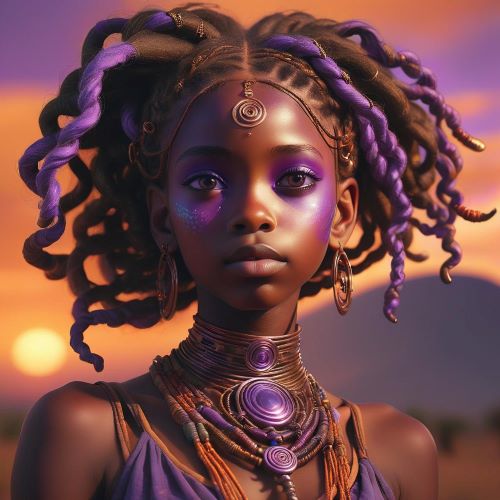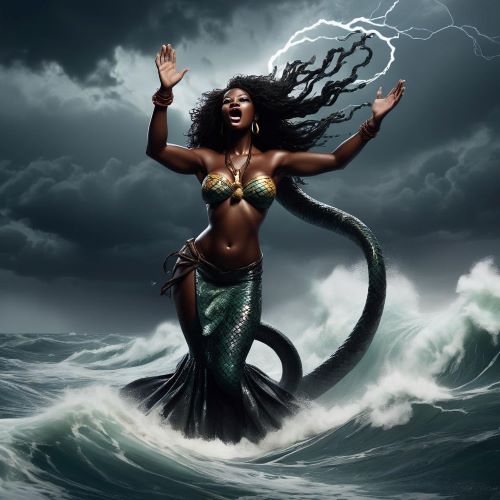Igbo Spirits
Igbo spirits play a vital role in the mythology of the Igbo people, one of the largest ethnic groups in Nigeria. These spirits are deeply intertwined with the everyday life and beliefs of the Igbo, serving as intermediaries between the physical and spiritual realms. Known as alusi or arusi, these supernatural beings govern various aspects of life, from fertility and agriculture to justice and protection. Igbo spirits are closely associated with natural elements like rivers, trees, and mountains, reinforcing the connection between humans and the environment. Through rituals, prayers, and sacrifices, the Igbo people seek the favor of these spirits to ensure harmony and prosperity.
The pantheon of Igbo spirits is vast and diverse, with each spirit possessing unique qualities and powers. Some are benevolent, guiding and protecting individuals or communities, while others can be vengeful if not properly respected or appeased. These spirits are believed to influence various aspects of life, including weather patterns, health, and the success of crops. They are often called upon during significant life events such as births, marriages, and deaths. Igbo mythology emphasizes the need to maintain balance and order, and the spirits play a central role in enforcing this equilibrium.
At the heart of Igbo spirituality is the belief that every natural element and living thing is imbued with a spirit. Rivers, trees, and even specific locations can have their own guardian spirits that protect the land and its people. For example, the river goddess Idemili is one of the most revered spirits, governing water and fertility. Spirits like her are honored in annual festivals, where offerings and sacrifices are made to ensure her continued favor. These rituals not only honor the spirits but also reinforce the community’s connection to nature and their reliance on the land for survival.
Many Igbo spirits are also linked to justice and morality. Spirits like Amadioha, the god of thunder and lightning, are seen as enforcers of truth and fairness. Amadioha is often invoked to resolve disputes, with the belief that he will strike down those who lie or commit injustice. This belief in spiritual justice underscores the importance of living in accordance with moral and ethical principles in Igbo society. The spirits serve as a constant reminder that human actions have consequences, not just in the physical world but in the spiritual realm as well.
Today, the influence continues to shape the cultural practices and religious beliefs of the Igbo people. While many Igbo have adopted Christianity, the traditional reverence for spirits remains deeply embedded in the culture. Rituals, festivals, and storytelling keep the legacy of Igbo spirits alive, ensuring that their teachings and presence continue to guide future generations. The myths surrounding these spirits offer insight into the values and worldview of the Igbo people, reflecting their belief in the interconnectedness of life, nature, and the spiritual world.
Igbo spirits play a vital role in the mythology of the Igbo people, one of the largest ethnic groups in Nigeria. These spirits are deeply intertwined with the everyday life and beliefs of the Igbo, serving as intermediaries between the physical and spiritual realms. Known as alusi or arusi, these supernatural beings govern various aspects of life, from fertility and agriculture to justice and protection. Igbo spirits are closely associated with natural elements like rivers, trees, and mountains, reinforcing the connection between humans and the environment. Through rituals, prayers, and sacrifices, the Igbo people seek the favor of these spirits to ensure harmony and prosperity.
The pantheon of Igbo spirits is vast and diverse, with each spirit possessing unique qualities and powers. Some are benevolent, guiding and protecting individuals or communities, while others can be vengeful if not properly respected or appeased. These spirits are believed to influence various aspects of life, including weather patterns, health, and the success of crops. They are often called upon during significant life events such as births, marriages, and deaths. Igbo mythology emphasizes the need to maintain balance and order, and the spirits play a central role in enforcing this equilibrium.
At the heart of Igbo spirituality is the belief that every natural element and living thing is imbued with a spirit. Rivers, trees, and even specific locations can have their own guardian spirits that protect the land and its people. For example, the river goddess Idemili is one of the most revered spirits, governing water and fertility. Spirits like her are honored in annual festivals, where offerings and sacrifices are made to ensure her continued favor. These rituals not only honor the spirits but also reinforce the community’s connection to nature and their reliance on the land for survival.
Many Igbo spirits are also linked to justice and morality. Spirits like Amadioha, the god of thunder and lightning, are seen as enforcers of truth and fairness. Amadioha is often invoked to resolve disputes, with the belief that he will strike down those who lie or commit injustice. This belief in spiritual justice underscores the importance of living in accordance with moral and ethical principles in Igbo society. The spirits serve as a constant reminder that human actions have consequences, not just in the physical world but in the spiritual realm as well.
Today, the influence continues to shape the cultural practices and religious beliefs of the Igbo people. While many Igbo have adopted Christianity, the traditional reverence for spirits remains deeply embedded in the culture. Rituals, festivals, and storytelling keep the legacy of Igbo spirits alive, ensuring that their teachings and presence continue to guide future generations. The myths surrounding these spirits offer insight into the values and worldview of the Igbo people, reflecting their belief in the interconnectedness of life, nature, and the spiritual world.



